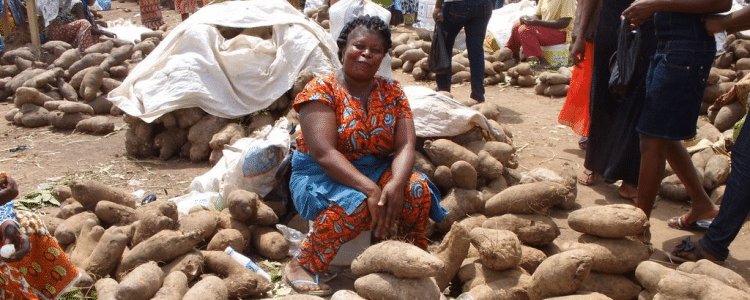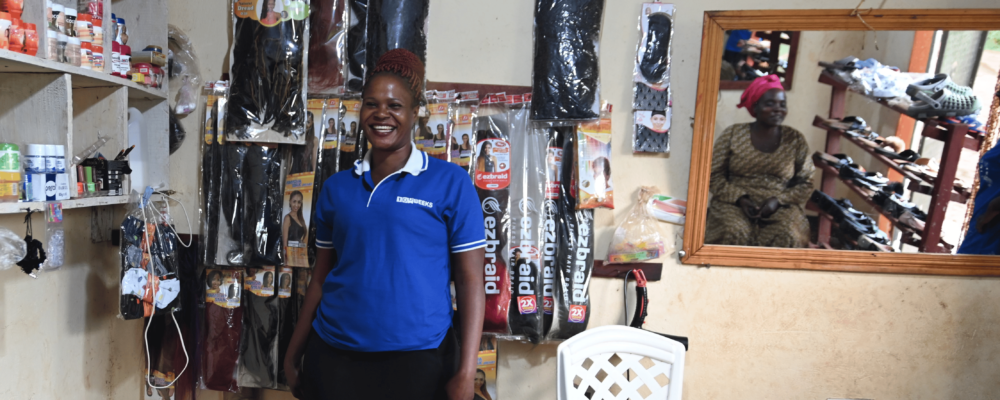
Bringing informal cross-border activities and trade into the formal economy is both a priority and a challenge for African governments, policymakers and donors, especially in the broader context of regional integration and cross-border trade. How do formalization policies and programmes respond to the needs and demands of informal female cross-border traders? And how can we ensure that female cross-border traders do not lose out in the formalization process?
Tackling such issues is motivated by the potential benefits, such as better and more sustainable jobs, a broader tax base (domestic resource mobilization), improved access to business services and the enhanced welfare of marginalized groups (e.g. youth, ethnic minorities, women), who are often confined to the informal economy – not to mention the collection of more accurate data on actual economic activity taking place. In this context, attempts to formalize trade activities have multiplied. At the policy level, Regional Economic Communities (RECs), such as the Common Market for East and Southern Africa (CMESA) or the East African Community (EAC), have set up the Simplified Trade Regime.1 At the programme level, initiatives to ease, facilitate and accelerate trade (including informal trade), such as TradeMark East Africa (TMEA)2 or the World Bank Charter for Cross Border Traders pilot, also include a focus on the formalization of cross-border trade.
Women: key actors in informal cross-border trade
But, to be effective, such policies and programmes need to consider the realities of informal cross-border trade. One of these is the high proportion of women as cross-border traders. For example, in the Southern African Development Community (SADC) region, 70% of the estimated US$17.6 billion in annual informal cross-border trade is carried out by women and in the EAC this figure is 74%, even though women predominantly trade in low-value and low-profit products. Finally, 85% of informal cross-border traders in the Great Lakes region of East Africa are women.
As stated in the World Bank Report (2012), informal cross-border trade is often the main or only source of income for women and plays a major role in sustaining the livelihoods of many households in Sub-Saharan Africa, particularly in situations where there is no other income (as in the case of households with an absent or unemployed husband). A 2009 ILO report demonstrates the importance of informal cross-border trade, pointing out that female cross-border traders have cushioned the effects of the financial and food crises in Uganda. That said, female cross-border traders continue to face a set of specific challenges, ranging from sexual harassment by government and customs officials at the borders3 to high taxation on traded goods, lack of access to capital, corruption, high transport costs and inefficiencies, and safety issues.
Therefore, the questions are, how do formalization policies and programmes respond to the needs and demands of informal female cross-border traders, if at all? And, secondly, how can we ensure that female cross-border traders do not lose out in the formalization process?
Although women are key actors in the informal economy, they are often excluded from policy processes, which are designed following a top-down approach. These processes are, therefore, often disconnected from the empirical reality (i.e. do not take into account cross-border traders’ needs and interests) and gender blind (i.e. do not address the most relevant specific concerns of women and men). As a result, these top-down policies can negatively affect human rights, but also socioeconomic development and, hence, the deepening of regional and trade integration.
Linking policy to practice taking into account gender realities
Keeping in mind that informal cross-border traders make a living because of inefficient borders, more appropriate, well-informed and understood (by informal cross-border traders) policies, supported by accompanying measures, are needed to ensure that women and men’s needs and interests are included and supported. In this regard, three particular areas stand out: strengthening the link from policy to practice, supporting female cross-border traders, and facilitating policy implementation.
1. Strengthening the link between policy and practice
Policies should be rooted in, and informed by, empirical data and research. Systems and mechanisms should be put in place to gather, monitor, assess and use gender disaggregated data on formal and informal cross-border trade so as to record, recognize and document the contribution of men and women informal cross-border traders. Such data will help in designing evidence-based policy that addresses the interests and needs of informal cross-border traders and could, in turn, lead to the formulation of wider national and regional economic policy for the informal sector.
Following the motto ‘Nothing for us without us’, from the Second Regional Women’s Forum for the SACBTA, female participation in policy making should be facilitated and encouraged, so that their specific constraints and challenges can be better addressed.4 This is key in times such as these when even male unemployment is growing in Sub-Saharan Africa.
2. Supporting female cross-border traders
To be efficient, any policies aiming at informal cross-border trade growth or formalization should address the (additional) barriers women face in accessing resources. These include:
- access to information (trade rules, explanation of protocols, market information), with provision of clear simplified documents in national languages
- access to finance (e.g. by helping women meet collateral requirements)
- access to skills and communication technology
- access to social and business networks
- access to better infrastructure with adequate shelter, roads, toilets, water and sewerage facilities, and garbage collection
3. Facilitating policy implementation
Partnerships between local CSOs, government agencies and the private sector could provide an efficient way to reach out to informal female cross-border traders, including by translating policies into practice and allowing informal female cross-border traders to benefit from supporting measures towards formalization, as outlined above.
Institutional arrangements supporting policies should also follow. First, informal cross-border trade is an issue, which potentially calls for REC involvement by, for example, providing (accessible) official focal points at borders who disseminate information in an adequate manner, as pointed out in a study by the United Nations Economic Commission for Africa (UNECA) 5. Such authorities should benefit from capacity building programmes to be able (and incentivized) to provide the necessary information to informal cross-border traders on customs protocols and their implications. Judicial and, more especially, non-judicial grievance mechanisms should also be provided for informal cross-border traders (especially women) to record, address and remediate any (human) rights abuses (theft, harassment, corruption etc.).
Finally, informal female cross-border traders’ associations/platforms should be encouraged to provide women with information and a voice so that they can freely raise their interests and needs. Where these already exist, women they should be empowered and trained to access them. Although these associations focus on women’s welfare, they should equally concentrate on improving women’s business skills, providing networking platforms, and creating collective bargaining power to raise women’s needs, interests and voices.
However, first and foremost, there needs to be a more in-depth understanding of the incentives and constraints that drive informal cross-border trade in the first place. Clearly, the shortage of other employment opportunities is one factor, but, beyond that, what are the specific economic, historical, cultural, institutional and other factors that shape small-scale cross-border trade? Such an understanding might mean that informal practices themselves can be a starting point for improving the lot of small-scale informal traders. With this kind of political economy understanding of the problem at hand, regional and national policymakers might be better placed to ensure that cross-border trade is inclusive, whether it is ‘formal’ or not.
Footnotes
- However, such policies have proved to have limited impact on informal trade; Van Hove, K. (2013) Crossing the border between Malawi and Zambia. Available at: http://ecdpm.org/talking-points/crossing-border-malawi-zambia-zalewa-route/
- TMEA has included a gender component in its programme since 2012.
- Brenton, P; Gamberoni, E & Sear, C (2013) Women and trade in Africa: realizing the potential. Washington, DC: World Bank. Available at: https://openknowledge.worldbank.org/handle/10986/16629
- Women representatives of Informal Cross Border Trader’s Associations (ICBTs) drawn from Botswana, Lesotho, Malawi, Mozambique, Namibia, Swaziland, Tanzania, Zambia and Zimbabwe (2013).
- NECA (2009) Gender dimensions of cross border trade in the East African Community – Kenya/Uganda and Rwanda/Burundi border. UNECA











